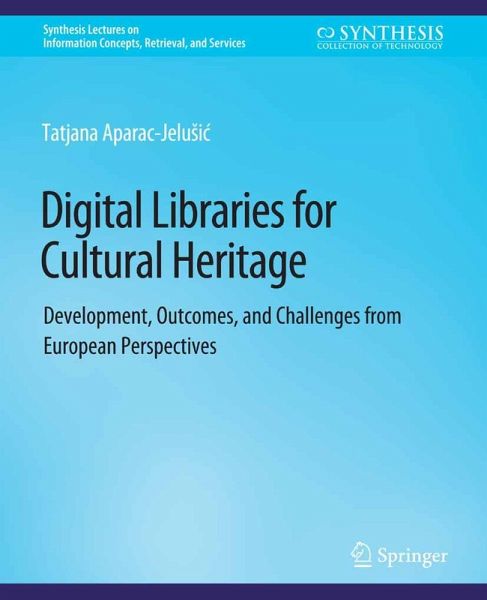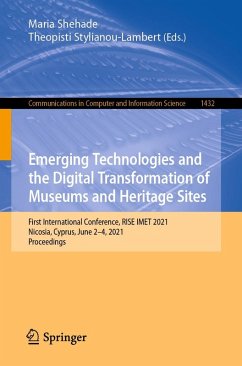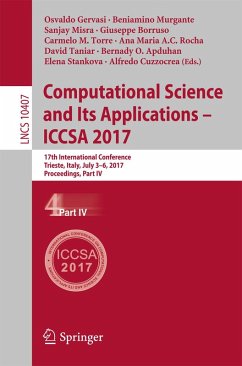
Digital Libraries for Cultural Heritage (eBook, PDF)
Development, Outcomes, and Challenges from European Perspectives
Versandkostenfrei!
Sofort per Download lieferbar
Statt: 53,49 €**
40,95 €
inkl. MwSt.
**Preis der gedruckten Ausgabe (Broschiertes Buch)
Alle Infos zum eBook verschenkenWeitere Ausgaben:

PAYBACK Punkte
20 °P sammeln!
European digital libraries have existed in diverse forms and with quite different functions, priorities, and aims. However, there are some common features of European-based initiatives that are relevant to non-European communities. There are now many more challenges and changes than ever before, and the development rate of new digital libraries is ever accelerating. Delivering educational, cultural, and research resources-especially from major scientific and cultural organizations-has become a core mission of these organizations. Using these resources they will be able to investigate, educate,...
European digital libraries have existed in diverse forms and with quite different functions, priorities, and aims. However, there are some common features of European-based initiatives that are relevant to non-European communities. There are now many more challenges and changes than ever before, and the development rate of new digital libraries is ever accelerating. Delivering educational, cultural, and research resources-especially from major scientific and cultural organizations-has become a core mission of these organizations. Using these resources they will be able to investigate, educate, and elucidate, in order to promote and disseminate and to preserve civilization. Extremely important in conceptualizing the digital environment priorities in Europe was its cultural heritage and the feeling that these rich resources should be open to Europe and the global community.
In this book we focus on European digitized heritage and digital culture, and its potential in the digital age. We specifically look at the EU and its approaches to digitization and digital culture, problems detected, and achievements reached, all with an emphasis on digital cultural heritage. We seek to report on important documents that were prepared on digitization; copyright and related documents; research and education in the digital libraries field under the auspices of the EU; some other European and national initiatives; and funded projects.
The aim of this book is to discuss the development of digital libraries in the European context by presenting, primarily to non-European communities interested in digital libraries, the phenomena, initiatives, and developments that dominated in Europe. We describe the main projects and their outcomes, and shine a light on the number of challenges that have been inspiring new approaches, cooperative efforts, and the use of research methodology at different stages of the digital libraries development. The specific goals are reflected in the structure of the book, which can be conceived as a guide to several main topics and sub-topics. However, the author's scope is far from being comprehensive, since the field of digital libraries is very complex and digital libraries for cultural heritage is even moreso.
In this book we focus on European digitized heritage and digital culture, and its potential in the digital age. We specifically look at the EU and its approaches to digitization and digital culture, problems detected, and achievements reached, all with an emphasis on digital cultural heritage. We seek to report on important documents that were prepared on digitization; copyright and related documents; research and education in the digital libraries field under the auspices of the EU; some other European and national initiatives; and funded projects.
The aim of this book is to discuss the development of digital libraries in the European context by presenting, primarily to non-European communities interested in digital libraries, the phenomena, initiatives, and developments that dominated in Europe. We describe the main projects and their outcomes, and shine a light on the number of challenges that have been inspiring new approaches, cooperative efforts, and the use of research methodology at different stages of the digital libraries development. The specific goals are reflected in the structure of the book, which can be conceived as a guide to several main topics and sub-topics. However, the author's scope is far from being comprehensive, since the field of digital libraries is very complex and digital libraries for cultural heritage is even moreso.
Dieser Download kann aus rechtlichen Gründen nur mit Rechnungsadresse in A, B, BG, CY, CZ, D, DK, EW, E, FIN, F, GR, HR, H, IRL, I, LT, L, LR, M, NL, PL, P, R, S, SLO, SK ausgeliefert werden.












